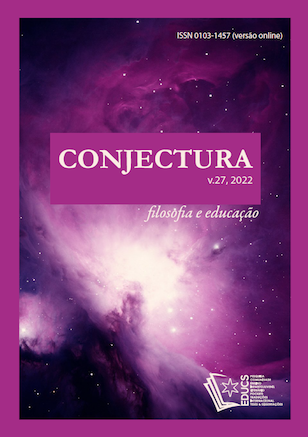Is it possible to eliminate transference in teaching?
DOI:
https://doi.org/10.18226/21784612.v27.e022018Abstract
This article aims to contribute to the way we think about how freudian psychoanalysis relates to education. Amongst the many classics that deal with this matter, we turn to Catherine Millot’s book, Freud anti-pédagogue, for it provides a broad view of our theme and presents a controversial conclusion: an antinomy between educating and analyzing. If this is true, can we think of a connection between pedagogy and psychoanalysis? Millot tells us that there cannot be an analytical pedagogy in the sense of a science of education, considering the referred science just as one uses it as acquired knowledge by psychoanalytical experience about the unconscious. This well-articulated discourse by Millot led us to believe (in academia) that there is a definite divide between these fields. Our question here is thus: may we think otherwise? For the present reflection, we follow the position of a contemporary brazilian thinker: Rinaldo Voltolini. He argues that the issue of the position of psychoanalysis in educational field is oriented towards a discourse of mastery. We will then take into consideration the impossibility of educating and the role of the ideal of the self in education. Voltolini states that such mastery is impossible. In his argument, mastery is understood as a maximizing the effect of education on child in a desired direction. In other words, a move towards an ideal. In this sense, we can ask ourselves, is it possible, after all, to eliminate transference in education? Or rather, can we make use of a transference attitude in teaching/learning? Our conclusion turns to the idea that the educator would work starting from his suggestive power; knowing this, he can rely on such power while educating.
Keywords: Psychoanalysis. Pedagogy. Freud. Millot. Voltolini.
References
CHAUI, Marilena. Escritos de Marilena Chaui: Em defesa da educação pública, gratuita e democrática. Belo Horizonte: Autêntica; São Paulo: Fundação Perseu Abramo, 2018. v. 6.
FOUCAULT, Michel. Histoire de la sexualité: La volonté de savoir. Paris: Gallimard, 2005. v. 1.
FREUD, Sigmund. A interpretação dos sonhos (1900). Trad. Paulo César de Souza. São Paulo: Companhia das Letras, 2019. v. 4.
FREUD, Sigmund. Três ensaios sobre a teoria da sexualidade, Análise fragmentária de uma histeria (“O caso Dora”) e outros textos (1901-1905). Trad. Paulo César de Souza. São Paulo: Companhia das Letras, 2016. v. 6.
FREUD, Sigmund. Observações psicanalíticas sobre um caso de paranoia relatado em autobiografia (“O caso Schreber”), Artigos sobre técnica e outros textos (1911-1913). Trad. Paulo César de Souza. São Paulo: Companhia das Letras, 2010a. v. 10.
FREUD, Sigmund. Totem e Tabu, Contribuição à história do movimento psicanalítico e outros textos (1912-1914). Trad. Paulo César de Souza. São Paulo: Companhia das Letras, 2012. v. 11.
FREUD, Sigmund. Introdução ao narcisismo, Ensaios de metapsicologia e outros textos (1914-1916). Trad. Paulo César de Souza. São Paulo: Companhia das Letras, 2010b. v. 12.
FREUD, Sigmund. Moisés e o Monoteísmo, Compêndio de psicanálise e outros textos (1937-1939). Trad. Paulo César de Souza. São Paulo: Companhia das Letras, 2018. v. 19.
KANT, Immanuel. Sobre a Pedagogia. Trad. João Tiago Proença. Lisboa: Edições 70, 2018.
LACAN, Jacques. Le Séminaire livre XI – Les quatre concepts fondamentaux de la psychanalyse (1964). Paris: Éditions du Seuil, 1973.
MERLEAU-PONTY, Maurice. L’instituition – La passivité – Notes de cours au Collège de France (1954-1955). Paris: Belin, 2003.
MILLOT, Catherine. Freud antipedagogo. Trad. Irene Agoff. Buenos Aires: Ediciones Paidós, 1982.
VOLTOLINI, Rinaldo. Educação e psicanálise. Rio de Janeiro: Zahar, 2011.
VOLTOLINI, Rinaldo (Org.). Psicanálise e formação de professores: Antiformação docente. São Paulo: Zagodoni, 2018.
Downloads
Published
How to Cite
Issue
Section
License
1. The publication of the originals will imply the assignment of copyright to Conjectura Journal.
2. Texts cannot be reproduced without authorization from the Journal after acceptance.









